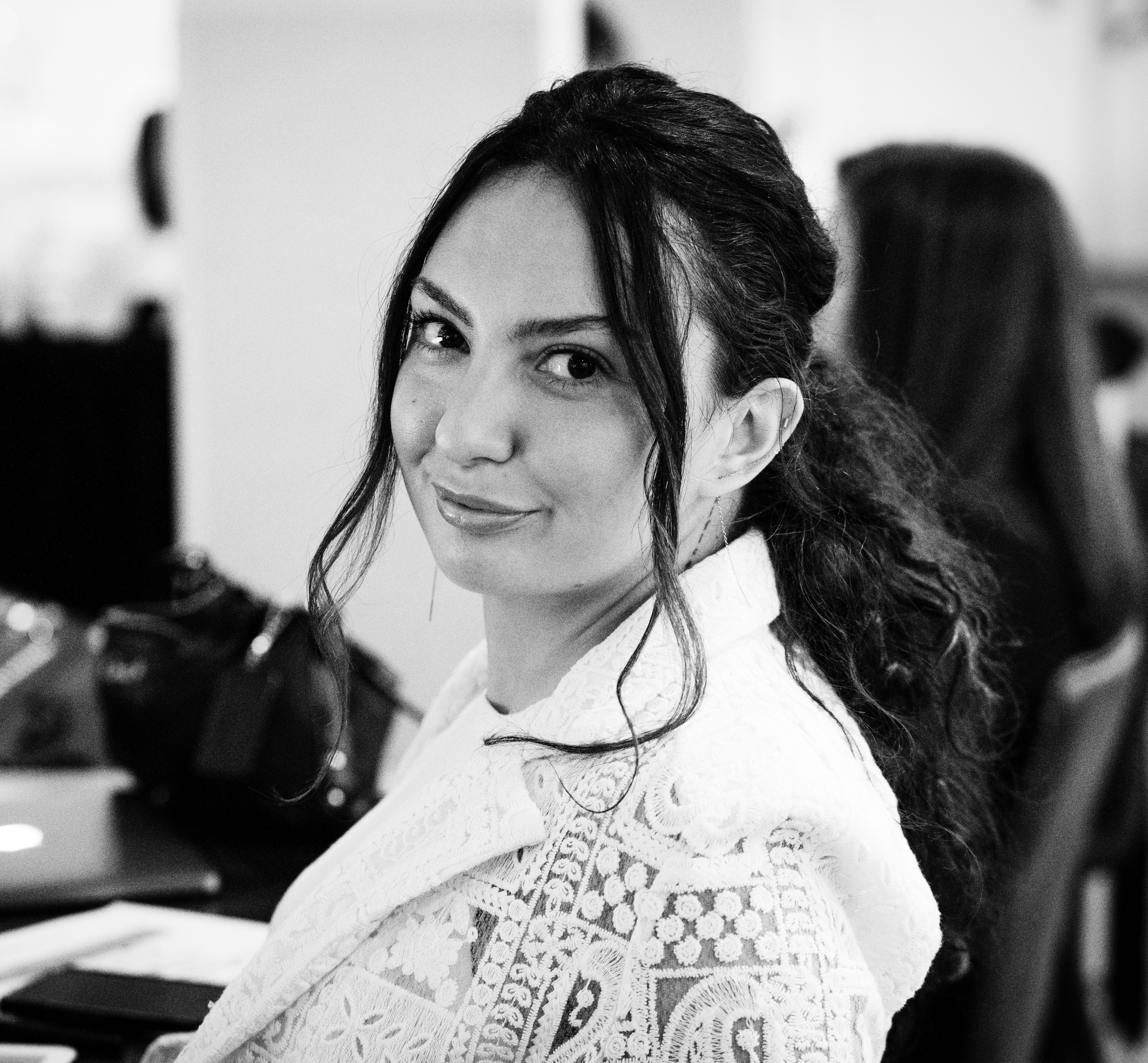The water was black. The dinghy was taking on water. Klea’s muffled screams were met with a gun in her face. Is this what America had to offer? Is this the American dream? Somewhere in Klea’s long journey from her family’s beautiful farm in Albania to her father’s studio apartment in the Bronx, she learned how to survive—at ten—not gently, but fiercely. Like steel. Klea was forged in fire….and this was just the beginning.
Her father had gone first, a welder who won the “visa lottery.” Unfortunately, he couldn’t take his wife and young daughter, Klea. He found another way. “He got connected with the cartel. He paid them to get fake passports for me and my mom.”
The journey took a month—Albania to Italy, Italy to Germany, Germany to South America, then Mexico. “It was insane. I was ten, but I grew up that year.” When they finally arrived, the dream didn’t look like freedom. The gorgeous open land of their Albanian vineyard became a dingy single-room Bronx apartment where the walls sweated alcohol and anger. “I cried for years. I missed my animals. I hated America.”
The pain of Klea’s childhood went far beyond a disdain for America. Within her house was rampant abuse— verbal, emotional, and most of all, physical. Her father and brother would beat Klea within an inch of her life on a daily basis. If she sat on the couch in a way they didn’t like. If she came home a little late. If she breathed the same air as them. There was nothing Klea could do but learn early that love and fear could sound like the same thing. “He’d bash my head on the floor. He put a knife to my neck and told me he’d kill me if I didn’t act right.”
At thirteen, she swallowed a bottle of Tylenol PM. “I wrote a goodbye letter. But I woke up. They thought I was on hard drugs.” She laughs softly. Dismissively. “No one even asked if I was okay.”
While her life was set to such strict boundaries, she, like most, felt the urge to rebel. Music became her outlet. “I’d blast Avril Lavigne, grab a broom, and sing. It was the only time I felt free.” By her teens, rebellion became a lifestyle. “I started skipping class, stealing candy from CVS. Forty bucks worth. They called my parents, and my brother and dad beat the crap out of me.” At 16, she was smoking weed. At seventeen, she ran away with a boy, the first person who gave her any semblance of love. “He was the first person who made me feel safe, and that was enough.”
When her brother found out, he kidnapped her. “He said he was sending me back to Albania to become a nun.” He forced her onto a plane, “But Interpol arrested him in Germany. I flew home by myself.” She smirks. “That’s when I stopped being scared of anyone.”
Freedom quickly turned into fuel. She got her first taste of fast money in sales — door-to-door energy accounts, commissions in cash. “I was good. Like, scary good. I could talk anyone into anything.” By her twenties, she was working on Wall Street until she managed to trade up to the Diamond District. “That’s when everything got wild.” She started selling jewelry to celebrities like Drake, Cardi B, Post Malone, Bella Hadid, The Weeknd. This is around the time that casual drinking turned to casual cocaine use. The lifestyle required it.
Klea became the kind of person people orbit around—confident, beautiful, unstoppable. Within this time, she bounced from jobs in New York to Miami, then back to New York, and then to Cabo, where she was offered a lucrative job with a good friend of hers. There, she started getting mixed into even more dangerous situations—getting on strangers’ boats to make offshore drug deals with the cartel. The high life.
Her own personal safety was no longer a concern—honestly, I don’t know if it ever was. The one person who was concerned with her safety was her friend Alex, the friend who gave her the job in Cabo. He was a protector, to Klea and all those he met. Tragically, Alex died at the Nova festival on October 7th while shielding others from gunfire.
After Cabo, Klea’s life of money, drugs, and chaos didn’t calm down. It did, however, go from fun with problems, to fun with problems and a new boy in Miami. He was a daily cocaine user. So, obviously, she became one too. And, of course, the only way to stop the come-down from coke is by drinking. So, every day, Klea would come home to a fresh bag, bottle, and brutal argument. Those arguments eventually became physical, and she knew she had to leave. “He split my mouth open. I posted a video with blood all over my face. I’d completely lost myself.”
She tried to kill herself four times that year. “I was 105 pounds. I thought I was going to die.” And yet, there was something in her—call it faith, call it survival, call it the strength she has held onto since birth—that refused to let go.
“My friend called and said, ‘My brother’s in AA in LA. I can fly you out.’
I told my ex, ‘I’m going to rehab. Give me a line of coke.’
He said, ‘You’re going to rehab?’
I said, ‘Exactly. That’s why I have to do a line now.’”
A last hurrah.
Klea’s first stop was a behavior modification center here in LA. They were strict on her. She looks back on her time there, knowing she learned a lot, but also that it was ultimately not for her. “It was so strict. I couldn’t breathe.”
A reminder of home.
When she left, she didn’t realize she was being guided somewhere better. Through a few divine connections, she found herself at Beit T’Shuvah. “I felt like I had finally gotten home. Like a real home. This is where I belonged, and I felt safe. I felt spiritual. I just felt the presence of God completely.” She remembers being at the water cooler and one of the first people she met here was Chaplain Adam. The smile on his face, that simple acknowledgment, meant the world to her. She felt safe. Seen. Supported. At BTS, people saw her for who she was—not the addict, not the victim, not the hustler—but the soul underneath it all.
During Klea’s stay here, she tried her best to rush through the program. She met a boy, and ultimately disconnected from the community. “I just felt like I needed to take a shot to celebrate how far I’d come.” Before long, she was showing up to Beit T’Shuvah drunk. Even in her drunken state, she had no intention of lying. So, she walked right up to Bradley Elkins and said, “I’m drunk.” He was shocked. The next morning, she packed her bags, left for the airport, and got wasted in the Terminal 3 bar—all while livestreaming it on Instagram. If you’re gonna go out, go out with a bang.
Back to New York. “My best friend Darren died. The last thing I said to him was, Go kill yourself. I didn’t mean it. I’m learning how to not be so reactive anymore. I really loved him. I miss him.” That’s when she knew it was time to come back home—her real home. So, Klea called Bradley 15 times a week, asking him to let her come back. He finally caved.
This time, Klea’s staying. For the first time, she is working with a sponsor, opening up with her treatment team, and even has two different work therapy internships—one for the Film Department and the other for Development.
Klea’s brilliance works differently now—using her slick, scheming, creative mind for good. The same instincts that once sold diamonds and deception now make her a force of nature in recovery. Her goal today is to give back to Beit T’Shuvah, whether it be through her internships or helping out the new residents.
There is one aspect of Klea’s story that is clear. Crystal clear to everyone—except maybe her. Klea is beloved. Coming from a life of turmoil, where survival instincts dictated so many of her behaviors, to where she is now. It’s hard to walk around this building and not find someone laughing at her jokes, impressed by her videos, or just all around enamored by who she is as a person.
In our spotlight interview, when talking through every beat of her trauma, Klea never broke. It was not until we started speaking about the love for her that lives within this community that she reached for the tissues—her tears melting away any semblances of a mask that was remaining. Because she knows that the schemes are done, the manipulation is over, and what the people at Beit T’Shuvah love isn’t a story. It’s her. Because there is no doubt that Klea has been forged in fire, survived the heat, endured the pressure, and came out the other side unbreakable—a diamond.
And we are all lucky to see her shine.

